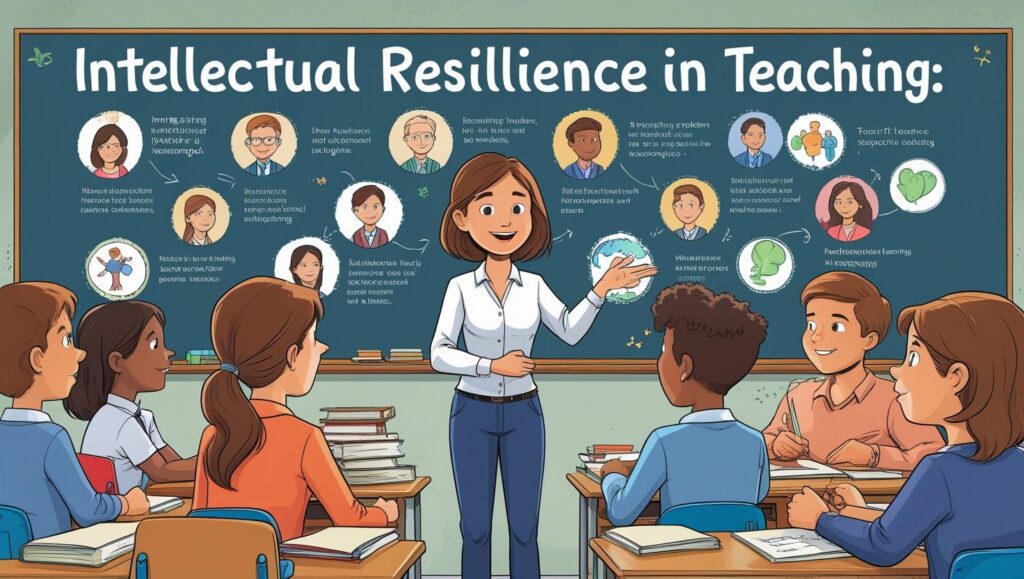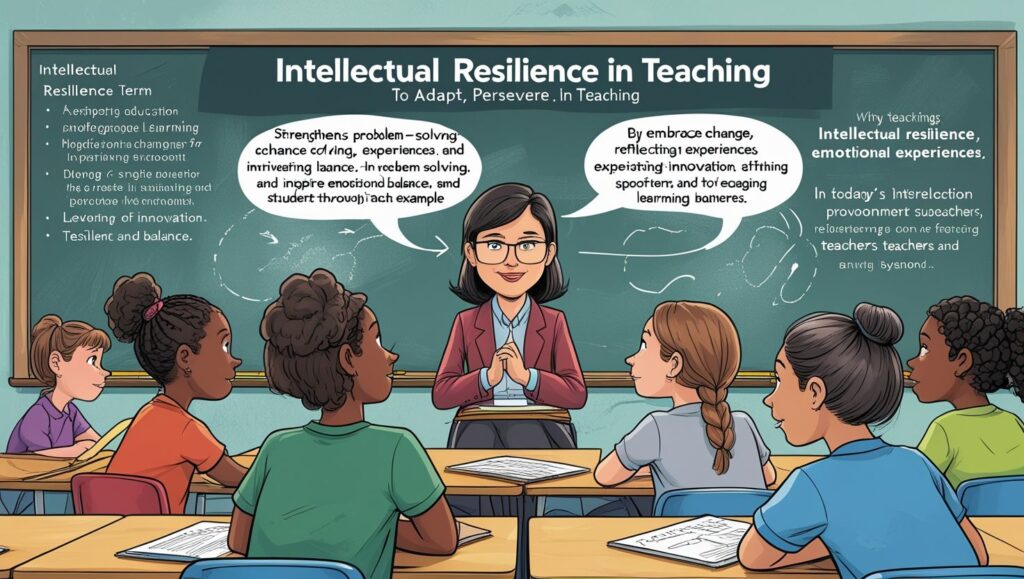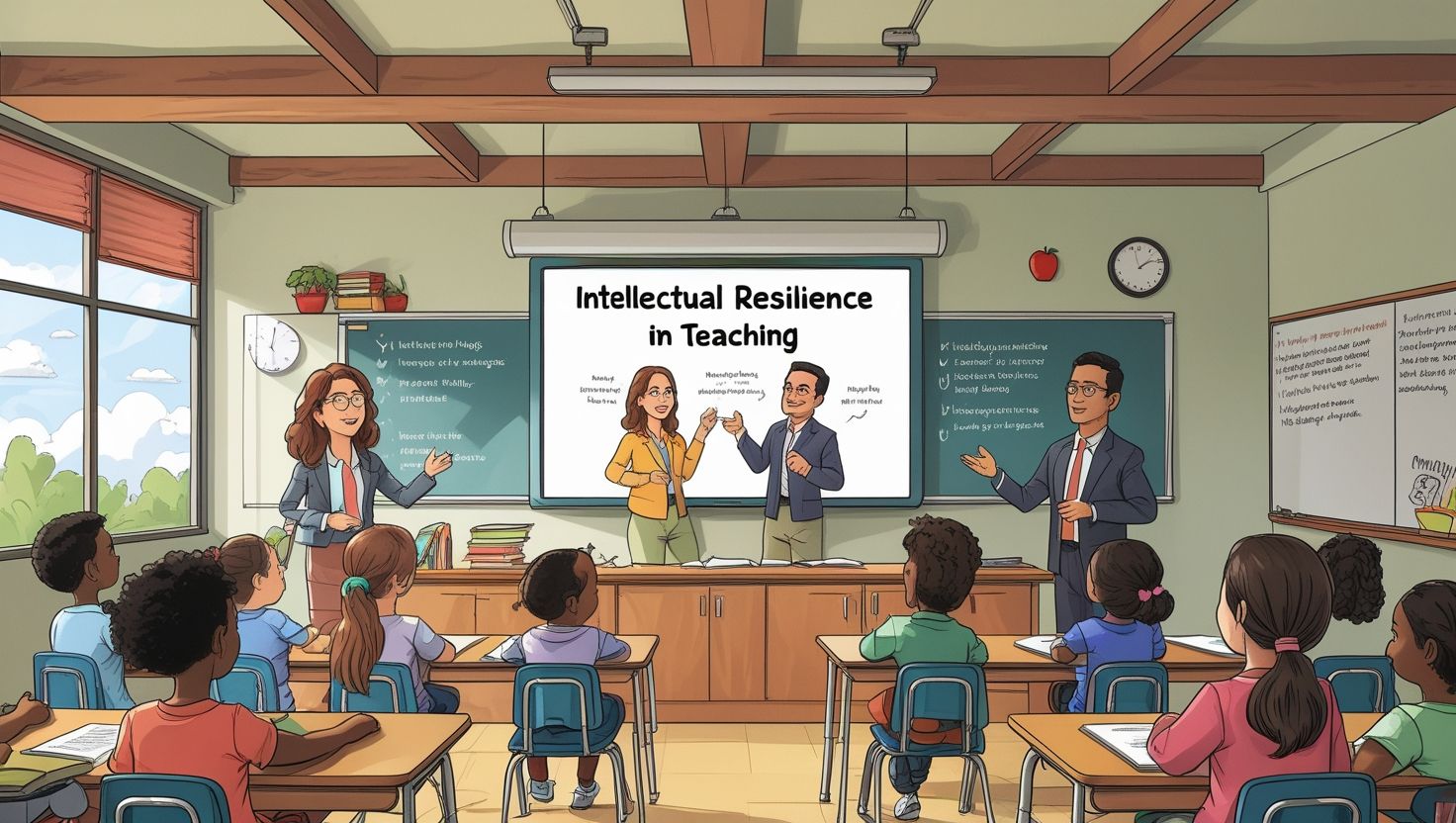Introduction
Intellectual resilience in teaching refers to the capacity of educators to think critically, adapt to challenges, and maintain strength in facing academic and classroom difficulties. Teachers are often confronted with diverse learning needs, shifting educational standards, and unpredictable classroom situations. To handle these, intellectual resilience becomes a crucial skill. It allows teachers to approach problems not as barriers but as opportunities for growth. Moreover, it nurtures perseverance in the face of professional struggles.
Teachers who practice intellectual resilience stay motivated and encourage their students to do the same. In addition, it promotes innovation by inspiring teachers to find fresh solutions. This capacity is not innate; it is developed through experience, training, and reflection. Therefore, understanding intellectual resilience helps teachers maintain balance, continue learning, and build effective teaching practices. By cultivating this quality, educators are better prepared to support both their own growth and the academic development of their students.
Importance of Intellectual Resilience in Education
The importance of intellectual resilience in education cannot be overstated. Teachers work in environments that are constantly evolving. They face curriculum changes, new technologies, and different student abilities. Without resilience, these challenges can cause stress, burnout, or reduced teaching effectiveness. However, resilient teachers can adapt quickly and maintain a positive outlook. Importantly, intellectual resilience enhances decision-making skills. Teachers remain calm, think clearly, and find effective solutions even under pressure.
Furthermore, it encourages reflective practice, where educators evaluate their own strengths and weaknesses to improve learning outcomes. In addition, resilience contributes to professional satisfaction. Teachers who can overcome obstacles with strength feel more confident and capable. They also inspire students by modeling perseverance and adaptability. When teachers embody resilience, students learn to face academic struggles with confidence. Thus, intellectual resilience not only benefits the teacher but also positively impacts the entire learning environment, making it essential in modern education.

Developing Intellectual Resilience in Teachers
Developing intellectual resilience requires conscious effort and practical strategies. Firstly, teachers must engage in continuous professional development. Training programs, workshops, and higher education courses expand their knowledge and strengthen critical thinking. Secondly, reflection is vital. When teachers analyze their experiences, they identify lessons learned and new approaches. Moreover, building supportive networks with colleagues fosters resilience. Sharing ideas, challenges, and solutions creates a sense of community.
In addition, mindfulness and stress management techniques improve focus and adaptability. Teachers who manage stress effectively can think more clearly. Importantly, resilience also comes from embracing mistakes. Teachers should view failures as opportunities for growth rather than setbacks. Furthermore, promoting curiosity encourages intellectual strength. Educators who remain open to new methods and ideas develop flexible thinking patterns. Finally, resilience is strengthened through practice. The more challenges teachers face and overcome, the stronger their intellectual resilience becomes. Hence, developing resilience is a dynamic process that ensures long-term teaching success.
Intellectual Resilience and Classroom Challenges
In classrooms, teachers face constant challenges that test their intellectual resilience. These challenges include disruptive behavior, diverse learning styles, limited resources, and high expectations. Without resilience, these obstacles may become overwhelming. However, resilient teachers see difficulties as chances for growth. For example, when faced with students struggling in subjects, they explore creative methods instead of giving up. Moreover, intellectual resilience enables teachers to remain patient during conflicts. Instead of reacting emotionally, they respond thoughtfully. Additionally, resilience allows educators to balance administrative demands with student needs.
They stay organized and focused, even under pressure. Importantly, resilient teachers encourage a positive classroom environment. They help students build confidence by demonstrating problem-solving in action. Furthermore, intellectual resilience inspires perseverance. Teachers continue striving for success despite repeated obstacles. In conclusion, classroom challenges are unavoidable, but with intellectual resilience, teachers transform these challenges into valuable opportunities for learning and growth, both for themselves and their students.
Role of Emotional Intelligence in Resilience
Emotional intelligence plays a vital role in strengthening intellectual resilience. Teachers must not only manage knowledge but also emotions—both their own and their students’. High emotional intelligence helps teachers remain calm in stressful situations. They can regulate emotions, avoid impulsive reactions, and focus on constructive solutions. Additionally, emotional awareness allows teachers to understand student needs more effectively. This understanding improves relationships and fosters trust in the classroom. Importantly, emotional intelligence promotes empathy. Teachers who empathize with students can adapt their teaching strategies, which supports resilience.
Moreover, emotionally intelligent teachers are better at handling criticism. Instead of feeling defeated, they use feedback for improvement. Another key aspect is motivation. Emotional intelligence helps teachers maintain a positive outlook, which fuels perseverance. Furthermore, emotional intelligence enhances collaboration with colleagues. Teachers who build strong relationships are more resilient when facing challenges. Therefore, emotional intelligence acts as a foundation upon which intellectual resilience is built and sustained in teaching.

Intellectual Resilience and Student Engagement
Student engagement is deeply connected to a teacher’s intellectual resilience. Engaged classrooms require energy, creativity, and adaptability. Teachers often encounter disengaged or distracted learners. Without resilience, frustration can easily take over. However, resilient teachers find innovative methods to capture interest. They integrate interactive lessons, real-life examples, and digital tools. Moreover, resilient teachers maintain patience when students struggle. Instead of blaming, they provide encouragement and alternative explanations.
Importantly, resilience helps teachers adjust teaching styles to meet varied learning needs. When one method fails, they try another without losing confidence. Additionally, intellectual resilience supports persistence in long-term goals. Teachers continuously inspire students even when progress is slow. Furthermore, resilience models perseverance. Students learn through observation, and when they see teachers remain determined, they adopt similar attitudes. Consequently, resilience not only increases teacher effectiveness but also creates an engaging and motivating learning atmosphere. In this way, intellectual resilience directly influences student engagement and learning outcomes.
Building a Culture of Resilience in Schools
To make resilience sustainable, schools must actively promote a culture that supports intellectual strength. A single teacher’s effort is valuable, but collective resilience creates greater impact. Firstly, leadership plays a crucial role. School leaders should encourage professional growth and provide safe spaces for teachers to share experiences. Secondly, collaboration strengthens resilience. When teachers work in teams, they exchange strategies and build mutual support. Moreover, schools should prioritize mental health and well-being.
Counseling services, workshops, and stress-management programs benefit both teachers and students. In addition, recognizing achievements boosts morale. When educators feel valued, their resilience strengthens. Importantly, schools must encourage innovation and experimentation. Teachers should feel free to try new methods without fear of failure. Furthermore, open communication fosters trust and reduces stress. When schools embrace resilience as part of their culture, both teachers and students thrive. Thus, a culture of resilience transforms schools into strong, supportive learning communities.

Intellectual Resilience in the Digital Age
In today’s digital world, teaching requires resilience more than ever. Technology has revolutionized classrooms, but it also presents unique challenges. Teachers must constantly adapt to new tools, online platforms, and digital teaching strategies. Without resilience, the rapid pace of change may cause stress. However, resilient teachers embrace technology as an opportunity rather than a burden. They learn new systems, integrate digital resources, and encourage student participation. Moreover, intellectual resilience helps manage online distractions.
Teachers develop strategies to keep students focused in virtual settings. Additionally, resilience ensures adaptability during disruptions, such as sudden transitions to remote learning. Importantly, digital resilience includes protecting against misinformation. Teachers must critically evaluate online sources and teach students to do the same. Furthermore, intellectual resilience inspires creativity with digital tools. Instead of relying on traditional methods, resilient teachers explore interactive technologies to enhance learning. Therefore, in the digital age, resilience is not optional but essential for effective teaching.
Conclusion
Intellectual resilience in teaching is a cornerstone of professional growth, effective learning, and classroom harmony. It equips teachers with the ability to face challenges, adapt strategies, and inspire students. Resilience promotes innovation, enhances decision-making, and strengthens emotional balance. By fostering resilience, teachers not only sustain their careers but also serve as role models for perseverance and adaptability. Importantly, resilience is not developed overnight. It requires continuous learning, reflection, and support.
Schools must therefore create environments that nurture resilience through collaboration, encouragement, and professional development. In the modern digital age, resilience has become even more crucial as education faces rapid transformations. Ultimately, intellectual resilience empowers teachers to remain strong, resourceful, and motivated in their mission to shape young minds. With resilience at the core of teaching, both educators and learners thrive in the pursuit of knowledge and personal growth.
References
- Gu, Q., & Day, C. (2013). Challenges to teacher resilience: Conditions count. British Educational Research Journal, 39(1), 22-44.
- Mansfield, C. F., Beltman, S., Broadley, T., & Weatherby-Fell, N. (2016). Building resilience in teacher education. Springer.
- Tait, M. (2008). Resilience as a contributor to novice teacher success, commitment, and retention. Teacher Education Quarterly, 35(4), 57-75.
- Howard, S., & Johnson, B. (2004). Resilient teachers: Resisting stress and burnout. Social Psychology of Education, 7(4), 399-420.
- Beltman, S., Mansfield, C., & Price, A. (2011). Thriving not just surviving: A review of research on teacher resilience. Educational Research Review, 6(3), 185-207.

Thanks for sharing. I read many of your blog posts, cool, your blog is very good.
Can you be more specific about the content of your article? After reading it, I still have some doubts. Hope you can help me.
Your article helped me a lot, is there any more related content? Thanks!
Your article helped me a lot, is there any more related content? Thanks!
Can you be more specific about the content of your article? After reading it, I still have some doubts. Hope you can help me.
I don’t think the title of your article matches the content lol. Just kidding, mainly because I had some doubts after reading the article.
Your article helped me a lot, is there any more related content? Thanks!
Can you be more specific about the content of your article? After reading it, I still have some doubts. Hope you can help me.
Your article helped me a lot, is there any more related content? Thanks!
Your point of view caught my eye and was very interesting. Thanks. I have a question for you.
Real wonderful information can be found on web site. “I said I didn’t want to run for president. I didn’t ask you to believe me.” by Mario M Cuomo.
You write with so much clarity and confidence. Impressive!
I agree with your point of view and found this very insightful.
Thank you for being so generous with your knowledge.
It’s great to see someone explain this so clearly.
Your tips are practical and easy to apply. Thanks a lot!
I hadn’t considered this angle before. It’s refreshing!
Your writing always inspires me to learn more.
I love how well-organized and detailed this post is.
I wasn’t expecting to learn so much from this post!
What an engaging read! You kept me hooked from start to finish.
This post gave me a new perspective I hadn’t considered.
Thank you for putting this in a way that anyone can understand.
I love how well-organized and detailed this post is.
I love how well-organized and detailed this post is.
This was very well laid out and easy to follow.
Your advice is exactly what I needed right now.
I really needed this today. Thank you for writing it.
Thank you for covering this so thoroughly. It helped me a lot.
I love how clearly you explained everything. Thanks for this.
I love how well-organized and detailed this post is.
You’ve done a great job with this. I ended up learning something new without even realizing it—very smooth writing!
I agree with your point of view and found this very insightful.
You’re doing a fantastic job with this blog.
I wasn’t expecting to learn so much from this post!
You’re doing a fantastic job with this blog.
Such a thoughtful and well-researched piece. Thank you.
Excellent work! Looking forward to future posts.
Your tips are practical and easy to apply. Thanks a lot!
Your content never disappoints. Keep up the great work!
I’ll definitely come back and read more of your content.
Thank you for your sharing. I am worried that I lack creative ideas. It is your article that makes me full of hope. Thank you. But, I have a question, can you help me? binance signup bonus